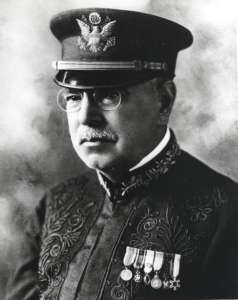
Typical 19th century brass band.
Band music
Another type of music in the central Kennebec Valley from early days of European settlement was band music. It was often, but especially in later years not inevitably, associated with military organizations; and like other forms of music, got limited attention in most local histories.
* * * * * *
James North, in his Augusta history, sometimes mentioned parade music, presumably provided by a band, as in his description of former president George Washington’s funeral procession in Augusta on Feb. 22, 1800.
North wrote that the procession was headed by a military escort. It included an infantry company, followed by musicians with “drums muffled, instruments in mourning,” followed by an artillery company.
By 1805, North wrote, Augusta had two military companies, and a group of young men persuaded the legislature (still in 1805 the Massachusetts General Court) to authorize a light infantry company.
The Augusta Light Infantry, which appears frequently in North’s history, was organized in the spring of 1806. North listed its officers and its musicians: fifer Stephen Jewett (the same Stephen Jewett who played the bass viol in church beginning in 1802? – see the July 27 issue of The Town Line) and drummer Lorain Judkins.
Some of the women connected with infantry members created and presented a company standard, with the motto “Victory or Death.” North described the Sept. 11, 1806, presentation as followed by a parade and a ball (presumably at least the ball and probably the parade included musicians).
By the time the Light Infantry was part of the local Federalist party’s July 4 parade in 1810, there was definitely a band. North wrote that its members politely stopped playing as the parade passed the house where Judge Nathan Weston was addressing the rival Democratic party celebration.
Another association between music and the military is the lists of men who fought in the War of 1812. Kennebec County historian Henry Kingsbury and many local historians listed soldiers (in 1812 and later wars) by name and rank, including musicians.
Most 1812 companies had either two or three musicians, though Kingsbury listed only one apiece for two of Vassalboro’s companies. The majority are described unspecifically as “musicians,” but Kingsbury mentioned a drum major and a fife major from Augusta.
By July 4, 1832, North again described two separate parades by two political parties, with multiple bands and military units. The National Republicans’ parade included “the Hallowell Artillery and Sidney Rifles, each with a band of music,” and the Hallowell and Augusta band, which he said was “one of the best in the State.” The Democrats’ parade included some of the Augusta Light Infantry and a band from Waterville.
There was an Augusta band in 1854, when Augusta city officials (the town became a city in 1849) decided the annual July 4 celebration should include recognition of the 100th anniversary of the building of Fort Western. Events included an extremely elaborate parade, with the Augusta Band providing the music.
And on April 18, 1861, as the Civil War began, North wrote that “the Augusta Band, playing patriotic airs” (including Yankee Doodle), led Augusta’s Pacific Fire Engine Company as members marched to the homes of leading citizens to ask their reactions to the rebellion.
(Their visits started with Governor Israel Washburn, Jr., and included his predecessor, former Governor Lot M. Morrill. North commented that Republicans and Democrats alike expressed support for the federal government.)
By August 1863, either there was another band or the Augusta Band had a second name. North described the return of two volunteer regiments whose members’ nine-months enlistments were up.
The 24th Regiment got to Augusta at 10:30 p.m. Aug. 6, by train; a large number of dignitaries and ordinary citizens and the Citizens’ Band escorted the soldiers to the State House for a welcome and a banquet (after which they slept on the State House floor, too exhausted to continue to Camp Keyes). The 28th arrived around noon Aug. 18; their welcoming parade included the Citizens’ Band and the Gardiner Brass Band, and their refreshments were served on the lawn south of the State House.
In 1864, according to North, it was the Augusta Band that on June 3 escorted the first trainload of wounded men to the new military hospital at Camp Keyes, in Augusta.
* * * * * *
In the village of Weeks Mills, in the southern part of the town of China, there was in the latter half of the 19th century an all-male brass band that the China history says “was more a marching band than a dance band,” because its concerts were mostly outdoors.
Sometimes there were concerts in “a town public hall” that was the second floor of a building on the east side of the Sheepscot, north of Main Street (which is called Tyler Road on the contemporary Google map). There was also a bandstand, “with a flagpole,” that band members built at the junction of North Road (now Dirigo Road, perhaps?).
Quoting a former resident named Eleon Shuman, some of whose family were in the band, the history adds, “Few of the band members could read music, and the band director transcribed their pieces into a simpler notation called the tonic sol fa method which they could follow.”
Oakland also had a town band by the late 1880s. In her history of Sidney, Alice Hammond wrote that the organizers of the 1890 Sidney fair spent most of their money to hire the Oakland Band.
She explained that in the absence of television and Walkmans (never mind smartphones), “To hear the band playing as you strolled around the fair grounds, or went into the hall and sat down to take a break was a treat.”
There were also dances some afternoons – “Anyone who wished to dance paid for one dance at a time.” In 1890, the fair was not lighted, so there was no evening music or dancing.
Hammond’s history included reproductions of two posters.
One advertised a Feb. 5, 1892, exhibition of “The marvels of the modern phonograph,” which would “Talk, Laugh, Sing, Whistle, Play on all sorts Instruments including Full Brass Band.” After Professor R. B. Capen, of Augusta, finished his demonstration, there would be a Grand Ball, with music by Dennis’ Orchestra, Augusta, for dancing until 2 a.m.
The second poster announced an Aug. 15, 1898, Grand Concert by the Sidney Minstrels. The program included vocal and instrumental (guitar, banjo and tamborine solos); it was followed by a “social dance” with music by Crowell’s Orchestra.
John Philip Sousa’s inaugural playing of The Stars and Stripes Forever, in Augusta

John Philip Sousa
An on-line site called Military Music says John Philip Sousa’s The Stars and Stripes Forever was played for the very first time by Sousa’s Band in the new (opened in 1896) city hall, in Augusta, Maine, on May 1, 1897. Because at that time the march had no title, some historians inaccurately date the first performance to a May 14 concert in Philadelphia.
Contributor Jack Kopstein wrote that Sousa composed the march as he was returning from Europe late in 1896. His original version called for “Piccolo in D-flat, Two Oboes, Two Bassoons, Clarinet in E-flat, Two Clarinets in B-flat (1-2), Alto saxophone, Tenor Saxophone, Baritone Saxophone, Three Cornets (1-3), 4 Horns in E-flat (1-4), Three Trombones (1-3), Euphonium, Tuba, Percussion.”
 Augusta’s Museum in the Streets (on line) says by May 1, 1897, Sousa’s Band was “the most famous in the land,” and Sousa was “America’s ‘March King.'” The afternoon concert presented some of his earlier compositions; “Sousa’s band enthralled the Augusta audience with spirited music, and his first encore was a new untitled march” – the one that became The Stars and Stripes Forever.
Augusta’s Museum in the Streets (on line) says by May 1, 1897, Sousa’s Band was “the most famous in the land,” and Sousa was “America’s ‘March King.'” The afternoon concert presented some of his earlier compositions; “Sousa’s band enthralled the Augusta audience with spirited music, and his first encore was a new untitled march” – the one that became The Stars and Stripes Forever.
On-line sites give different versions of the words for the march. The one attributed to Sousa begins, “Let martial note in triumph float / And liberty extend its mighty hand….”
Your writer’s personal favorite begins “Be kind to your web-footed friends / For a duck may be somebody’s mother.” (The web attributes these words to radio comedian Fred Allen [1894-1956].)
Augusta’s 1896 city hall was designed by John Calvin Spofford (Nov. 25, 1854 – Aug. 19, 1936), a Maine-born, Boston-based architect well-known for designing public buildings in New England. In addition to municipal offices, the building included a city auditorium.
Kopstein, writing in 2011, said the building served its municipal function until 1987; it then became an assisted living facility. An on-line description of the Inn at City Hall says it now has “31 apartments with its historic decor preserved throughout the complex.”
Main sources
Grow, Mary M., China Maine Bicentennial History including 1984 revisions (1984)
Hammond, Alice, History of Sidney Maine 1792-1992 (1992)
Kingsbury, Henry D., ed., Illustrated History of Kennebec County Maine 1625-1892 (1892)
North, James W., The History of Augusta (1870)
Websites, miscellaneous.








 Discuss holding in-person town meetings, pre-pandemic
Discuss holding in-person town meetings, pre-pandemic



